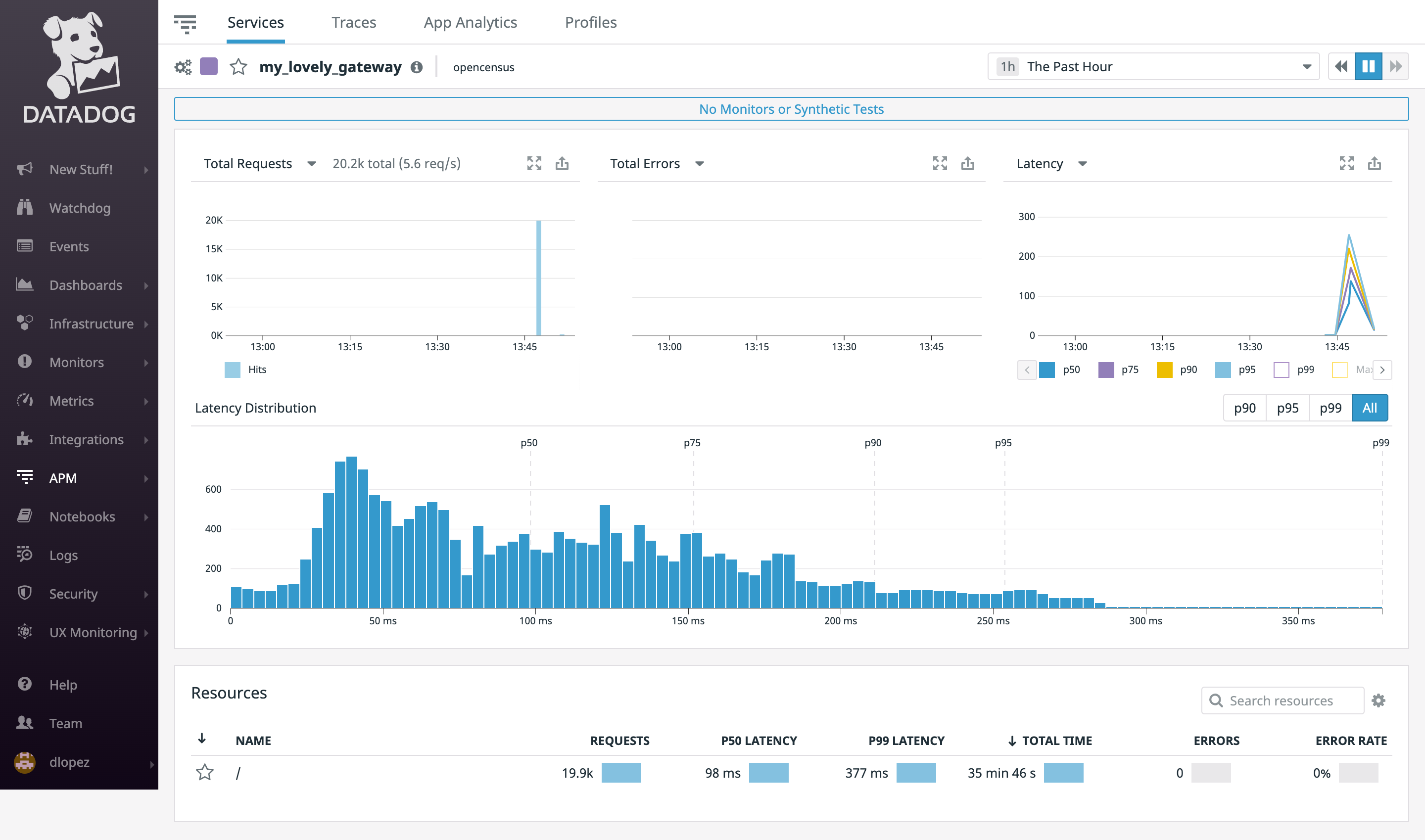Document updated on May 15, 2024
Datadog Telemetry Integration

Datadog is a cloud monitoring and security platform for developers, IT operations teams, and businesses.
The OpenTelemetry integration allows you to send metrics and traces to Datadog using their collector.
Datadog configuration
Datadog uses the standard OTLP exporter, here is a configuration example:
{
"version": 3,
"$schema": "https://www.krakend.io/schema/krakend.json",
"host": [
"http://localhost:8080"
],
"debug_endpoint": true,
"echo_endpoint": true,
"extra_config": {
"telemetry/opentelemetry": {
"exporters": {
"otlp": [
{
"use_http": false,
"port": 4317,
"host": "ddagent",
"name": "my_dd_exporter",
"disable_metrics": false,
"disable_traces": false
}
]
},
"trace_sample_rate": 1,
"service_name": "krakend_dd_telemetry",
"metric_reporting_period": 1
}
}
}
The important part of the configuration is the otlp exporter, which accepts the following fields:
Fields of "telemetry/opentelemetry": { "exporters":{} }
otlparray- The list of OTLP exporters you want to use. Set at least one object to push metrics and traces to an external collector using OTLP.Each item of otlp accepts the following properties:
custom_metric_reporting_periodinteger- Whether you want to override the global
metric_reporting_periodattribute set for all exporters or not. Value in seconds. A missing attribute, or set to0means using whatever value was used inmetric_reporting_periodat the global level.Defaults to0 disable_metricsboolean- Disable metrics in this exporter (leaving only traces if any). It won’t report any metrics when the flag is
true.Defaults tofalse disable_tracesboolean- Disable traces in this exporter (leaving only metrics if any). It won’t report any metrics when the flag is
true.Defaults tofalse host* string- The host where you want to push the data. It can be a sidecar or a remote collector.
name* string- A unique name to identify this exporter.Examples:
"local_prometheus","remote_grafana" portinteger- A custom port to send the data. The port defaults to 4317 for gRPC unless you enable
use_http, which defaults to 4318.Defaults to4317 use_httpboolean- Whether this exporter uses HTTP instead of gRPC.
In addition, you can configure how the layers behave (see all options).
Datadog agent
You must set your Datadog API key in the agent. The exporter communicates with the agent and is the agent the one reporting to Datadog.
Here’s an example of how to run the Datadog agent together with KrakenD in a docker compose file:
version: '3'
services:
krakend:
image: krakend/krakend-ee:2.12.4
volumes:
- "./:/etc/krakend"
command: ["run", "-c", "krakend.json"]
ports:
- "8080:8080"
datadog:
image: gcr.io/datadoghq/agent:7
pid: host
environment:
- DD_API_KEY=XXXXXXXXXXXXXXX
- DD_OTLP_CONFIG_RECEIVER_PROTOCOLS_GRPC_ENDPOINT=0.0.0.0:4317
- DD_OTLP_CONFIG_RECEIVER_PROTOCOLS_HTTP_ENDPOINT=0.0.0.0:4318
- DD_SITE=datadoghq.com
volumes:
- /var/run/docker.sock:/var/run/docker.sock
- /proc/:/host/proc/:ro
- /sys/fs/cgroup:/host/sys/fs/cgroup:ro
Notice that we are naming the service ddagent in Docker compose, and this matches our host field in the configuration.
Migrating from OpenCensus
Prior to v2.6, telemetry sent to Datadog used the OpenCensus exporter. Enabling required adding the datadog exporter in the opencensus module, and the configurations looked like this:
{
"version": 3,
"extra_config": {
"telemetry/opencensus": {
"sample_rate": 100,
"reporting_period": 0,
"exporters": {
"datadog": {
"tags": [
"gw"
],
"global_tags": {
"env": "prod"
},
"disable_count_per_buckets": true,
"trace_address": "localhost:8126",
"stats_address": "localhost:8125",
"namespace": "krakend",
"service": "gateway"
}
}
}
}
}
You can migrate to OpenTelemetry doing the following changes:
- Rename
telemetry/opencensustotelemetry/opentelemetry. sample_rate-> Delete this fieldreporting_period-> Rename tometric_reporting_perioddatadog-> Rename tootlp, and add an array surrounding the object, so it becomes"otlp": [{...}]namespace-> Rename tonametag_host,tag_path,tag_method,tag_statuscode-> Delete them
